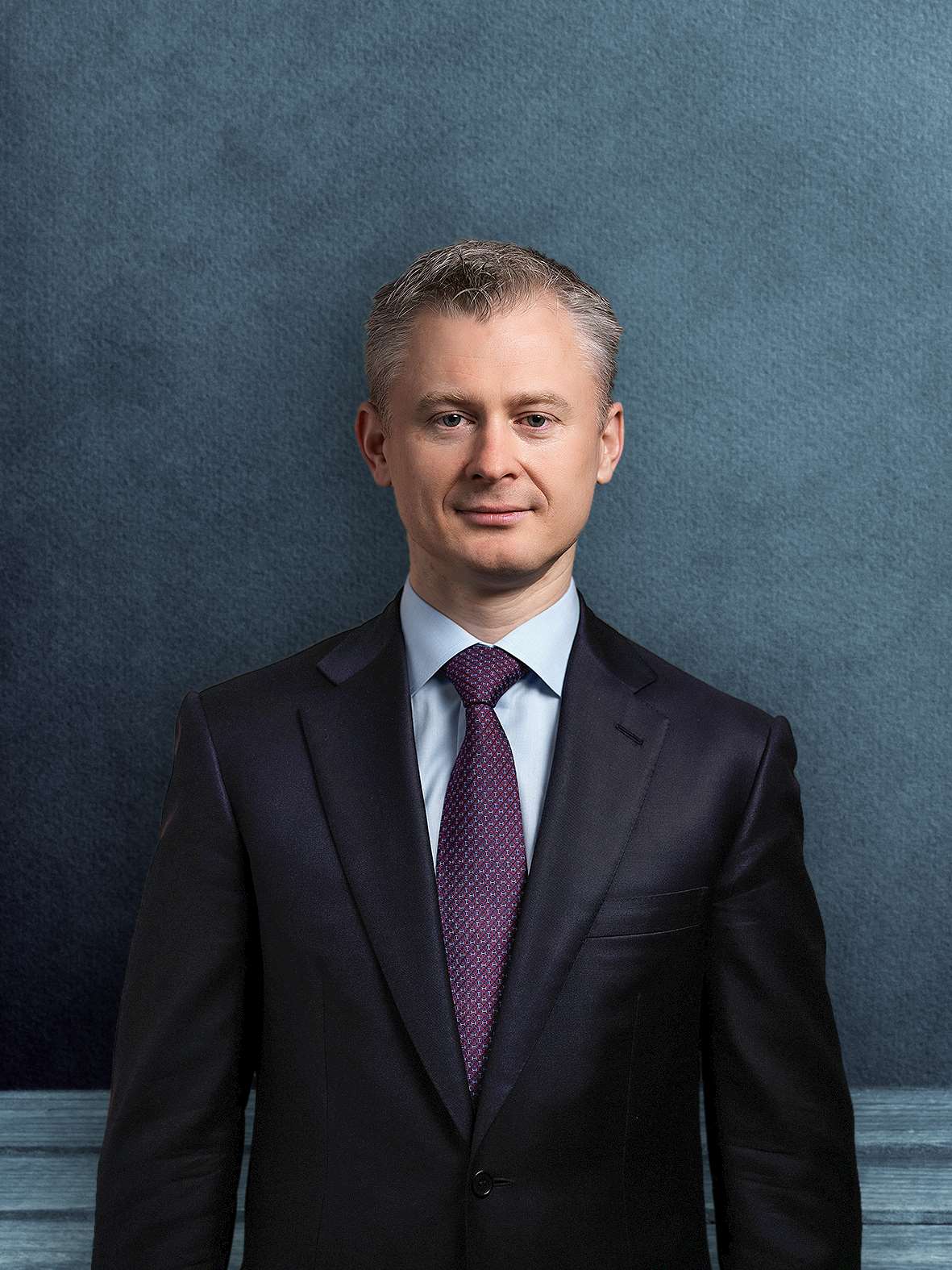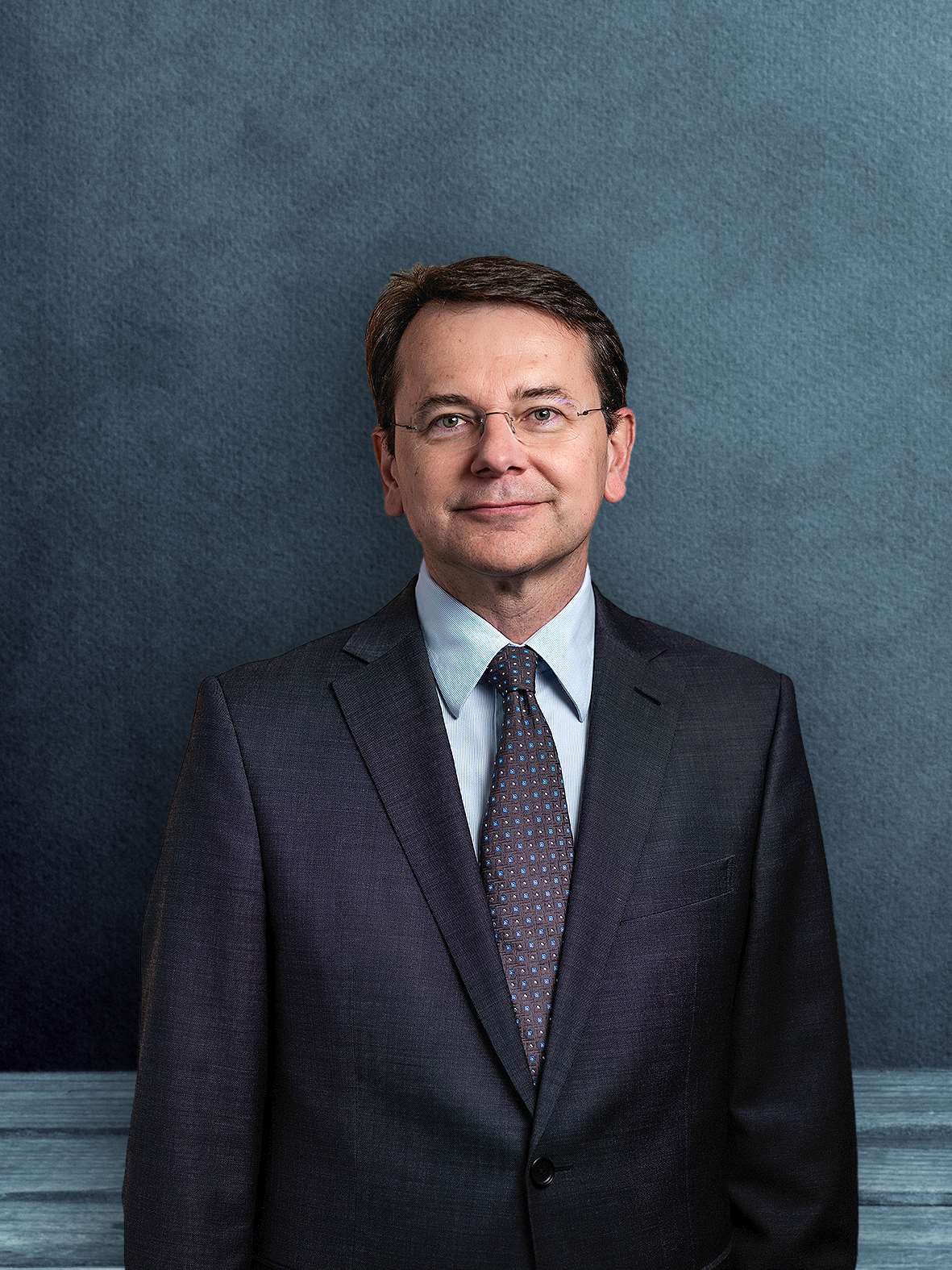Board of directors
The Board of Directors determines the Companyʼs guiding principles and strategic direction. It is the Companyʼs ultimate governing body and is therefore responsible for overseeing the Executive Management. Since the last AGM there were no personnel changes in the Board of Directors.
The following list provides an overview of the members of the Board of Directors as of 31 March 2019.
As representative of Lamesa Holding SA, Vladislav Osipov was the only non-independent director on 31 March 2020.
1./2. Members of the Board of Directors/Other activities and interests

Dr. Wolfgang Zürcher
Dr. Wolfgang Zürcher joined the Board of Directors in 2014 and was newly elected Chairman of the Board of Directors by the AGM on 18 June 2019. In addition, he chairs the Nomination/Compensation Committee (NCC) and is a member of the Audit (AC) and the Investment Committee (IC).
Dr. Zürcher holds a doctorate in law from the University of Zurich and a Master of Laws (LL.M.) from the University College London. He works as an attorney at Wenger & Vieli law firm and is a board member of various listed and non-listed companies. Dr. Zürcher is also a notary of the Canton of Zug and a recognized representative on the SIX Swiss Exchange.

Vladislav Osipov
Dipl. Ing. Vladislav Osipov joined the Board of Directors of Züblin in 2012. He is Chairman of the Audit Committee (AC) and a member of the Nomination/Compensation & Corporate Governance Committee (NCC) as well as the Investment Committee (IC).
Vladislav Osipov studied Engineering at the Moscow Aviation Institute. He holds both a Masterʼs degree in Electromechanical Engineering as well as in Economics & Finance from the International University of Moscow. Between 1994 and 2005 he held various management positions as Financial Controller and Risk Manager within the ABB Group in Germany and Russia. In addition to various management positions with Swiss companies – including Coalco AG – he managed the Swiss Family Office of a global metal and real estate group. Since 2010 he has been Managing Director of Centiveo AG, a Family Office Management Company based in Zurich. Mr. Osipov represents the interests of Züblinʼs major shareholder on the Board of Directors.

Dr. Markus Wesnitzer
Dr. Markus Wesnitzer joined the Board of Directors of Züblin in 2006. He is the Chairman of the Investment Committee (IC) as well as member of the Audit (AC) and the Nomination/Compensation & Corporate Governance Committee (NCC).
Dr. Wesnitzer studied Economics at the University of Erlangen-Nürnberg and obtained a PhD at University of Bamberg. Since 1996, he has been responsible for the Real Estate Division at Schickedanz Holding in Fürth. In the year 2000, he joined the Executive Board of ICN Immobilien Consult Nuremberg, where he has been responsible for acquisitions and commercial and technical portfolio management since then. As a real estate family office, ICN manages a portfolio focusing on office and retail properties in major German cities and Switzerland.
None of the current Directors held executive office within the Züblin Group or has had a significant business relationship for the past three reporting periods. For further information see Note 5.12 “Related parties”, in the notes to the consolidated financial statements of the Züblin Group
3. Ordinance against excessive pay in listed companies (VegüV)
Under the Companyʼs articles of association (Art. 21), the members of the Board of Directors may not hold more than 15 other directorships, of which no more than 5 may be in listed companies.
4. Elections and terms of office
4.1 Board of Directors
The members of the Board of Directors are elected individually by the AGM for a term of office of one year, with the Chairman of the Board being elected at the same time. As a rule the members of the Board of Directors step down when they reach the age of 70. The Board of Directors of Züblin Immobilien Holding AG is currently made up of three non-executive directors. There are currently no interlocking memberships on other boards of directors.
4.2 Nomination, Compensation and Corporate Governance Committee (NCC)
The members of the NCC are elected individually by the AGM for a term of office of one year.
4.3 Other Committees
The other committees and their members (AC/IC) are elected for a one-year term of office at a constitutive Board Meeting following the AGM.
5. Internal organization
5.1 Allocation of responsibilities within the Board of Directors
The roles of Vice-President and Delegate of the Board of Directors do not exist. A division of responsibilities within the Board of Directors is not envisaged.
5.2 Board committees, their responsibilities and powers
The task of the committees is to prepare the groundwork for decisions by the full Board. Decisions are taken by majority vote.
5.2.1 Audit Committee (AC)
The Chairman of the Audit Committee is Vladislav Osipov. The other members are Dr. Wolfgang Zürcher and Dr. Markus Wesnitzer. The Audit Committee supervises the Executive Management with regard to implementation of corporate strategy, compliance with statutory and other regulations, internal regulations and directives, and risk management. It also supervises the auditors, and reviews the results of the annual audit as well as the accounting principles and financial control mechanisms.
5.2.2 Nomination, Compensation and Corporate Governance Committee (NCC)
The Chairman of the NCC is Dr. Wolfgang Zürcher. The other members are Vladislav Osipov and Dr. Markus Wesnitzer. The NCC lays down the principles for the compensation of the Board of Directors and the Executive Management, including the definition of individual targets for the Executive Management which form the basis for the operating performance bonus. NCC is also responsible for the appointment and dismissal of the members of the Executive Management and Board Members of subsidiary companies.
5.2.3 Investment and Strategy Committee (IC)
The Chairman of the IC is Dr. Markus Wesnitzer. Dr. Wolfgang Zürcher and Vladislav Osipov act as members. The Committee monitors compliance with the processes for purchases and sales of properties and ensures the strategic investment guidelines are implemented.
5.3 Work methods of the Board of Directors and its committees
The Board of Directors convenes 1 physically, by telephone or in the form of video conferencing as as often as business requires. For the financial year 2019/20 the Board of Directors met for seven ordinary as well as two extraordinary meetings. On average, the meetings last five hours. The Board of Directors is quorate when a majority of its members are present. Decisions are taken by majority vote. In the event of a tied vote, the Chairman has the casting vote. E.o. meetings of the Board of Directors are convened pysically or in the form of calls or videoconferencing and decisions taken by circular resolution if required. Minutes are taken of Board meetings and conference calls; decisions taken by circular resolution are recorded in the minutes of the following meeting. Executive Management usually participates in the meetings of the Board of Directors.
Meetings of the AC take place primarily in preparation for the annual and semi-annual reports or if particular transactions so require. In financial year 2019/20 the AC met twice for an average duration of two hours.
Meetings of the NCC are held primarily with regard to setting the compensation for the Board of Directors and Executive Management. The NCC met four times in the financial year 2019/20 for an average duration of two hours. In the year under review, no external advisors were consulted for the determination of compensation, stock option programs or other compensation relevant mandates.
Meetings of the IC mainly take place in connection with the acquisition of properties. During the reporting period, the IC met twice for a duration of two hours. In addition, the IC met for a strategy related workshop.
The attendance rate at Board and Committee meetings was 100%.
1 Board Meetings as well as meetings of all Committees were held as Calls and/or Video Conferences as of 19 March 2020
6. Definition of areas of responsibility
The organization of the Board of Directors and Executive Management is governed by the organizational rules and regulations approved by the Board of Directors in July 2015 and is reproduced in summary form below.
The non-transferable duties of the Board of Directors are listed in detail in the articles of association under article 16 (available on the Companyʼs website www.zueblin.ch or directly from the company). In its role as the companyʼs ultimate governing body, the Board of Directors is responsible for:
- maintaining overall oversight of the company and laying down its organizational structure
- structuring accounting, financial planning and financial control
- appointing and dismissing members of the companyʼs management and persons empowered to represent the company and stipulating their signature powers
- supervising and overseeing the activities of Executive Management, appointing and dismissing members of Executive Management including with regard to their compliance with the law, articles of association, regulations and directives
- preparation of the annual report and the Annual General Meeting and subsequent implementation of its resolutions
The processes applying to the purchase of real estate are dealt with separately. The Board of Directors has drawn up guidelines for these purchases, which govern investment targets, performance and quality specifications. The Board of Directors takes all decisions on the purchase and sale of real estate on the basis of proposals from Executive Management. The approval of the Board of Directors is always required in cases when an acquisition is connected with a capital increase or the issuance of a bond.
All other duties, in particular the management of the ongoing operating business, are the responsibility of Executive Management. Executive Management submits a budget with a three-year business plan (including a budget for property renovations) to the Board of Directors every year and is responsible for implementing it once it has been agreed. Regulations governing approval limits also stipulate which financial decisions can be taken by Executive Management and which have to be submitted to the Board of Directors.
7. Information and control instruments vis-à-vis Executive Management
Executive Management submits regular structured reports to the Board of Directors. The flow of information between the Board of Diretors and Executive Management is also assured by virtue of the fact that Executive Management usually attends the meetings of the Board of Directors.
Following information and control instruments are available to the Board of Directors:
- Group consolidation including comparison with previous year and budget as well as an analysis of any deviations (quarterly management information system)
- Reports on financing activities including cash management
- Detailed reports from Executive Management on the development of the portfolio
- Risk management system (quarterly risk sensitivity analysis broken down into property market and financing risks). For further information on risk management, please refer to the notes in the consolidated financial statements, section 3.
- ICS – Internal Control System.
Due to its size the company does not have an internal audit function. If any reviews or investigations are required Züblin therefore commissions third parties or external auditors to perform these. However, no such instances occurred during the reporting year.





